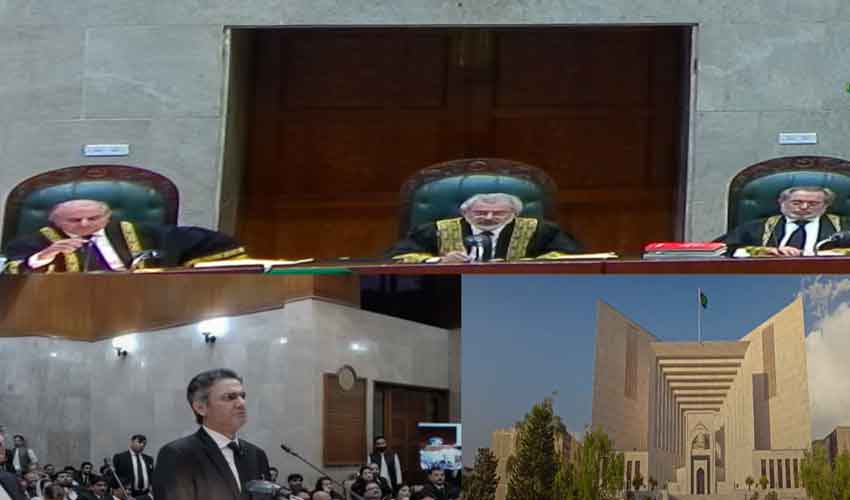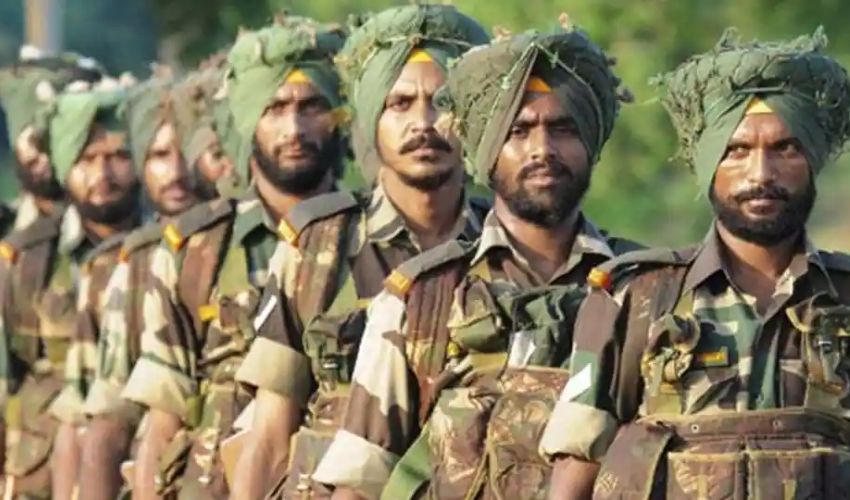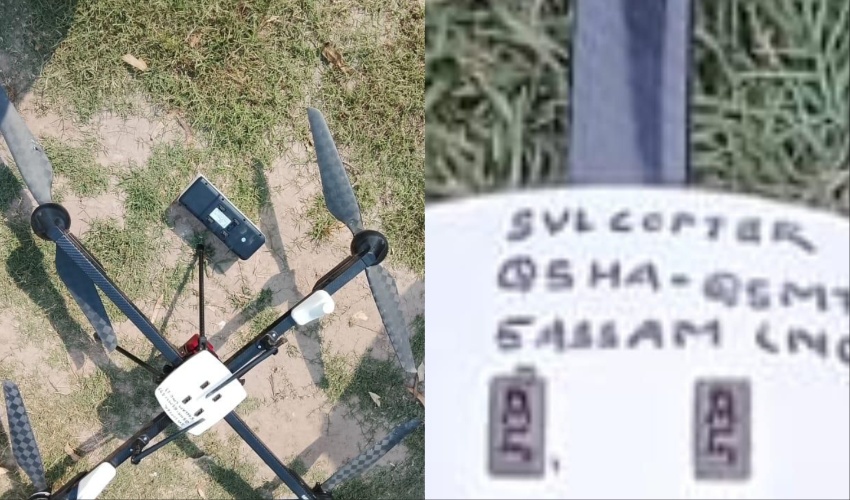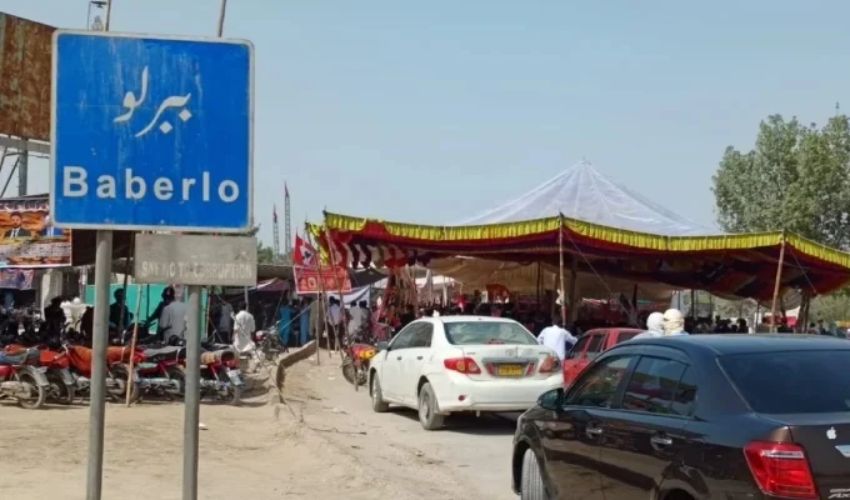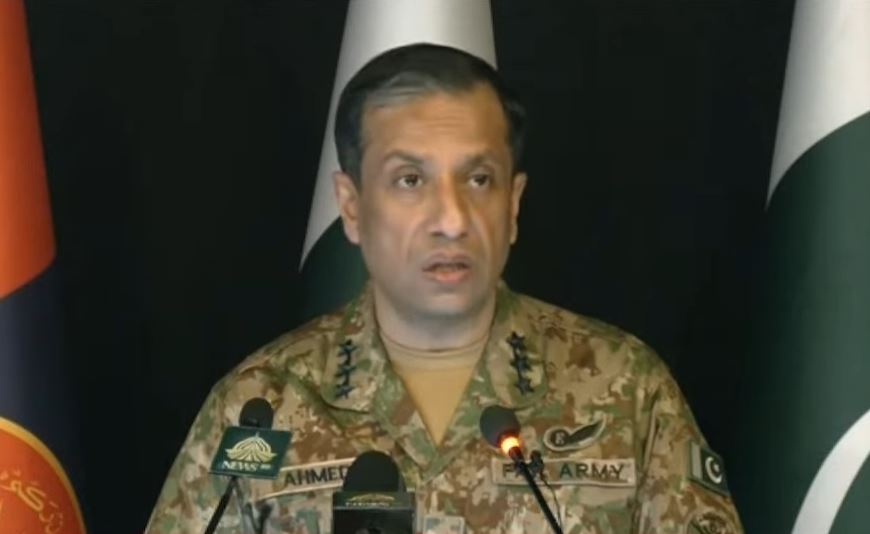The Supreme Court heard a suo motu case concerning alleged interference in the judiciary, following a letter from six judges of the Islamabad High Court regarding the issue.
A six-member larger bench, led by Chief Justice of Pakistan Qazi Faez Isa, conducted the hearing. Other members of the bench were Justice Mansoor Ali Shah, Justice Jamal Mandokhel, Justice Athar Minallah, Justice Musarrat Hilali, and Justice Naeem Akhtar Afghan.
In addition to the primary case, the bench also heard 11 separate pleas seeking to become parties in the proceedings. Notable petitioners include Shehbaz Khosa, representatives of the Pakistan Bar, as well as Islamabad and Sindh High Court Bars, Balochistan lawyer organisations and Mian Dawood.
These petitions collectively urge the Supreme Court to investigate the purported interference in the judicial process.
No attacks from within or outside
The CJP started off by saying a committee had decided that all available judges would hear the case, adding that Justice Yahya Afridi had pardoned from sitting on the bench. He said he thought a full court would hear the case, but two judges were not available.
"People probably do not want independence of the judiciary. We will ensure the independence of this court," CJP Isa stressed, insisting that there should be no attack on the court from within or outside.
Also Read: IHC judges' letter: Justice Yahya Afridi recuses himself from bench
The chief justice also said he was not responsible for the history of the court, asking for suggestions, if there were any.
He then asked the attorney general for Pakistan if he had read the IHC's suggestions. AGP Mansoor Usman Awan replied in the negative.
"It is not just suggestions, but a charge sheet," Justice Minallah remarked.
The Supreme Court then ordered to make the suggestions of the Islamabad High Court public. "Everything is being broadcast on the media, so we should also make it public," CJP Isa declared, and then ordered the attorney general to read out the IHC's recommendations in court. The AGP complied.
The CJP asked if the high court could not itself take steps according to the Constitution on the points mentioned in the suggestions. The AGP replied that it could take action itself on all points.
Also Read: PM Sharif meets CJP Isa over IHC judges' letter controversy
The CJP noted that the Supreme Court could not interfere in the high court's matters, as in the past, the results of such interventions have not been good.
Lahore High Court suggestions
Justice Minallah said the suggestions sent by the high court should be appreciated, adding that if there was no response, the judges will not be fearless. “We should look at the points raised by the IHC judges,” he said further, adding that the judges have said the alleged interference is an ongoing issue.
The AGP also read out the suggestions sent by the Lahore High Court, according to which judges' meetings with members of the intelligence agencies must be banned and amendments made to the Code of Conduct for district judiciary and high courts. The LHC also proposed giving the authority to appoint and transfer NAB and ATC judges to the high courts, as there were sensitive issues in these institutions, thus the interference is also high.
The LHC has observed that executive intervention in the judiciary is an open secret. Justice Mandokhel said the Lahore High Court is also talking about intervention.
The CJP said a chief justice should not ask a judge to deal with a case in a specific manner, adding that the independence of the judiciary is also affected by appointing a monitoring judge and creating a JIT against the law. "Ever since I became the chief justice, not a single case of interference has come before me," he asserted, adding that he would not allow any interference in the judiciary.
Also Read: SC takes suo motu notice of IHC judges' letter, to take up case on Wednesday
CJP Isa questioned if it was not intervention when bar presidents sat in judges' chambers in the subordinate judiciary. Justice Minallah said he agreed with the chief justice that there should not be such interference from within. "We have to solve the internal matter ourselves," he remarked. "When the state becomes aggressive against a judge, it becomes a different matter."
Justice Minallah questioned what happened to a judge of the Islamabad High Court since the last hearing, adding that the judge's personal data, which is not accessible to any private person, was leaked on social media. "All high courts have upheld the existence of interference. They are saying that this interference is happening even today," he added.
Justice Shah remarked that this case should be taken as an opportunity and resolved once and for all. Justice Mandokhel said two members of the bench were also being targeted.
"I know many judges who are cautioned that their child's whereabouts are known," Justice Minallah said, adding that in 2018, a campaign was launched against him also. "It is the responsibility of the state when the NADRA data of one's wife and children becomes public."
District judiciary suggestions
Justice Mandokhel said the Lahore High Court has also not come up with the complete truth, adding that it has talked about intervention, but did not do it openly. CJP Isa commented that the district Judiciary had also sent some suggestions, which were read out by the AGP.
Also Read: Federal cabinet approves inquiry commission to investigate IHC judges' letter
The district judiciary's proposals included action by identifying the organizations and individuals involved in phone tapping or video recording of judges or families; contempt of court proceedings by judges if state agencies interfered or blackmailed; where there is interference, the chief justice, district and sessions judge or any judge could summon CCTV recordings; if the sessions judges do not conduct proceedings themselves, they should report to the high court that will form a five-judge bench and decide the matter.
If a high court judge reports such a matter, then the chief justice of Pakistan should look into it, the proposals included.
Martin Luther King, Akbar Allahabadi
Justice Shah observed that everyone has become courageous because of this case, and it will bring surprising results. Justice Minallah said he found the Balochistan High Court's reply interesting, adding that it said everything through the poetry of Martin Luther King and Akbar Allahabadi.
"Interference was always there; this culture has been there for 76 years," he further remarked.
CJP Isa intervened and told the judge not to include him in the statement, adding that in the 76 years, there have been many people who did not allow interference. Justice Minallah said he has also not condemned everyone, adding that he was the chief justice of a high court for four years, and no one had the courage to interfere.
"During my tenure, no other judge of the high court was approached," Justice Minallah stated. Justice Hilali said those who could not bear the pressure should not sit on this chair.
No one speaks the truth
Justice Minallah addressed the AGP and said he had mentioned interference in 2016-17 as well, asking whose government it was at the time. The AGP said the PML-N, to which the judge asked if that government was also helpless. "The problem is that everyone knows the truth but no one says anything. Now that six judges have spoken the truth, everyone is after them. It is our duty to speak the truth," he added.
CJP Isa remarked that pressure existed everywhere in the world, including in the bureaucracy where calls are made to carry out certain jobs. Some people obeyed the orders, and those who did not, were made OSD. "We shouldn't paint a bad picture of us," he added.
Also Read: IHC CJ seeks proposals on judges' letter about alleged interference
Justice Minallah said that if a judge shows some courage, a reference is filed against him. The CJP commented that the reference did not go to intelligence agencies, and that they had to look into it and impose fines. "We have also given the judgment in the Shaukat Aziz Siddiqui case."
Justice Minallah inquired what action had been taken in the Shaukat Siddiqui case, which was such a big decision. Attorney General Awan said a former chief justice was also involved in the case. At this, Justice Minallah said there should be accountability, whether it is a former chief justice or the current one.
"We all have been in high courts, we should be fair. There is no powerful response to the complaints of high court judges. If the culture of deviance from orders becomes a norm, it discourages judges from speaking up."
Institutional reaction deemed solution
When the CJP asked to read out Justice Yahya Afridi's note, Justice Minallah reminded him he had himself believed that there was political engineering against him in 2017. The CJP said that politics should be left out, to which Justice Minallah said it was a reality, as there had never been civil supremacy.
The judge also said that when the state itself adopted aggression, no citizen could fight it, and the only solution was institutional reaction.
Under what law do agencies operate?
Justice Afghan remarked that there were agencies operating in the country: IB, ISI and MI. He then asked under which law they were formed, and also said the court should be informed in the next hearing the law under which these agencies worked.
Justice Shah then said the high courts were looking at the SC to do something. At this, the CJP said that there should be no interference in the high courts.
Justice Shah questioned if any of the high courts have asked the apex court not to take up this case. "When the SC sends an indirect message, it creates problems," he added.
CJP Isa remarked that he had said intelligence agency reports would not be considered in judges' appointments and that they wouldnt be part of the judicial commission. "Those who talk about the independence of the judiciary may not know this, but after that this series stopped."
Attorney General Mansoor Usman Awan rejected the notion that the six IHC judges writing a letter constituted misconduct.
Hearing adjourned till May 7
Justice Shah said intelligence agencies should also respond in this case, Justice Minallah said the agencies should be asked to submit an affidavit that there was no interference, The chief justice said they should not get into endless debates, adding that the agencies were under the federal government, which could file a response. "If someone asks me for an affidavit, I will also say that there was interference in the Supreme Court." he maintained.
When Justice Minallah told the AGP he had himself admitted all this happened during his government, the CJP remarked that they should move forward and make Pakistan efficient, adding that these were old issues. Justice Minallah quipped that with due respect, this was not an old issue, but of today.
AGP Awan said he wanted time till Monday or Tuesday to submit the government's response. The CJP set the next date as May 7.
Lawyer Hamid Khan suggested a full bench should have been formed, consisting of all the available judges. Justice Minallah said Hamid Khan was the most senior among all the lawyers present, they could all submit their suggestions to him and he could forward them. The CJP said he would prefer democracy over seniority. There were Pakistan Bar Council and Supreme Court Bar Association and lawyers could submit proposals through the PBC.
After the hearing, the court order said that the petitioners could submit proposals, the AGP should submit a response on behalf of the federal government, and if there is any allegation related to an intelligence agency, they should submit a response through the AGP.





